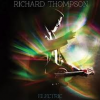Liverpool Sound and Vision Rating * * * *
There can be no doubting the staying power of Richard Thompson, if anything the man who cut his musical teeth with the likes of Fairport Convention has become more prolific as the years have gone by and compared to those that that once stood alongside him, Richard Thompson remains as likeable and musically pleasing as he ever did, something he has proved once more in his latest release Electric.
Some artists release albums that lyrically you wonder what has been so traumatic in their lives, others the non-stop partying and counter culture plays a huge part. However, for Richard Thompson, it must have a life so fuelled by watching the absurdity of human behaviour and taking acerbic pleasure in doing so that makes his lyrics fit so well with his genuinely superb guitar playing that makes him one of the few artists to give the listener a huge smile on their face no matter the subject matter.
This wonderful sense of humour kicks off Electric in some great fashion. Stony Ground sees Richard play with words in fantastic way but not overburdening the tune in anyway. The fundamental way in which an old man, no matter how advanced in years can still find a woman attractive is endearing and lovingly performed and the way in which the woman goes to fend off the man’s advances is surely something that every man can recognise. It is also has the unique lyrical view that would have made the great Welsh poet Dylan Thomas smile in regret for not writing it himself, its poetic beauty is only enhanced by the wry smile that the listener imagines to be plastered all over his face whilst recording the song.
From this great start the album never falters throughout, a sense of wonderment and inescapable imagery stroll through the music and lyrics perfectly. Tracks such as Salford Sunday, the disturbing Stuck on the Treadmill and the well observed and embittered My Enemy deliver Richard Thompson straight back into territory he works well in and should be seen as a real classic from one of the veteran patrons of the music business.
Ian D. Hall
